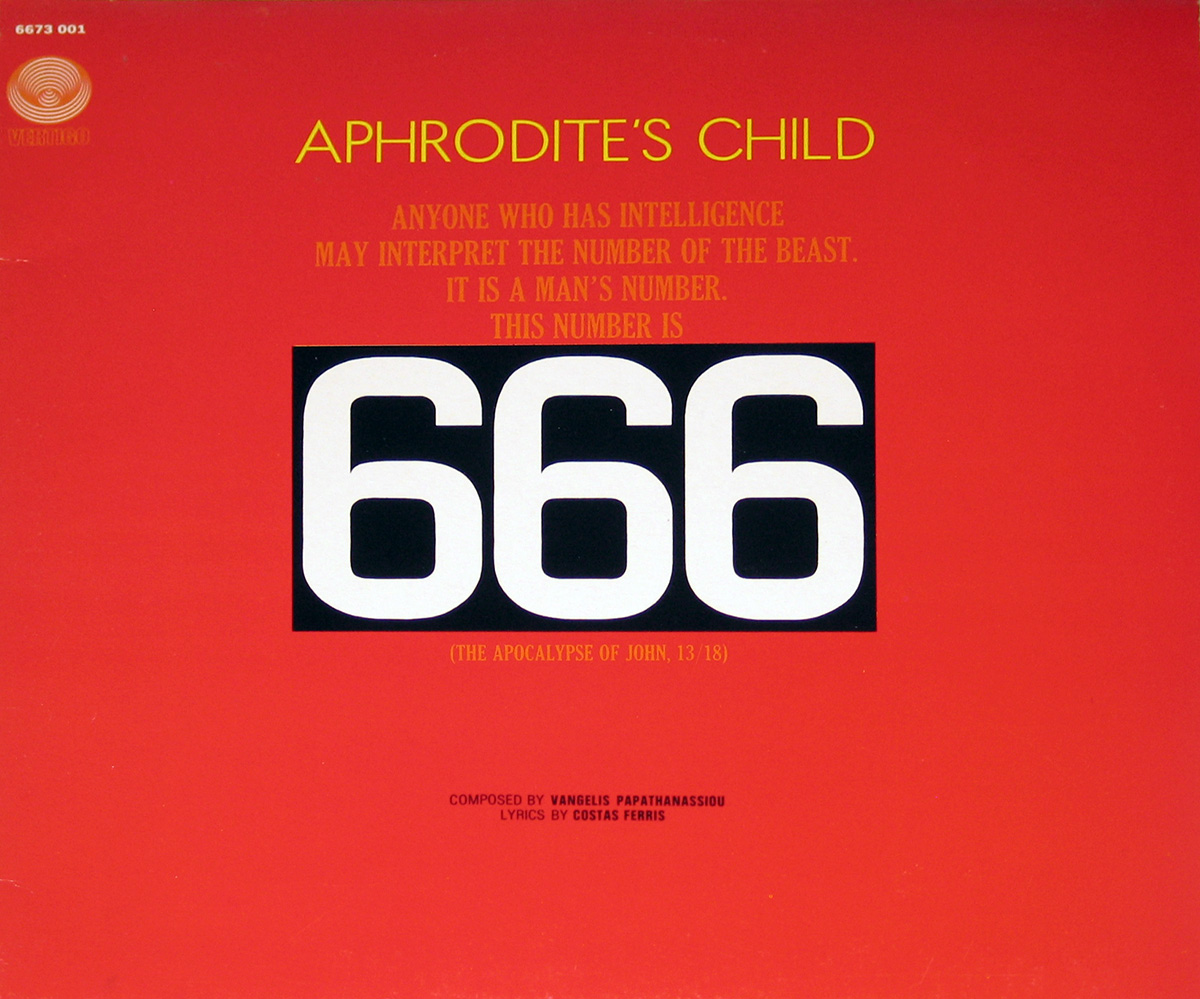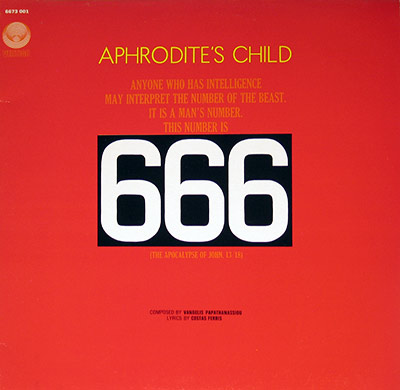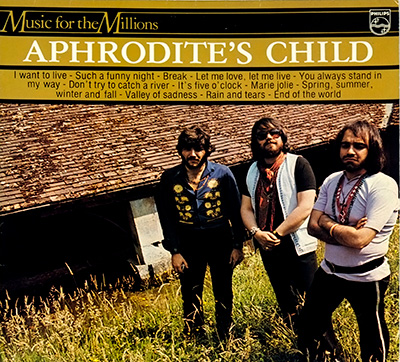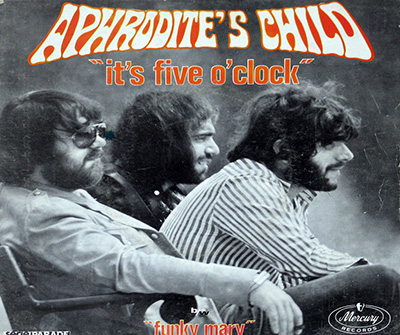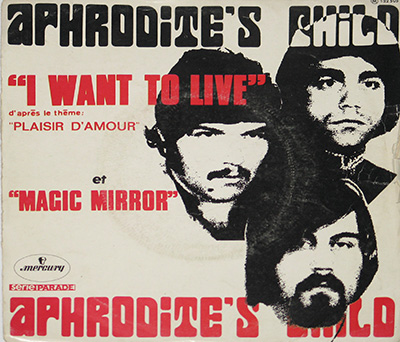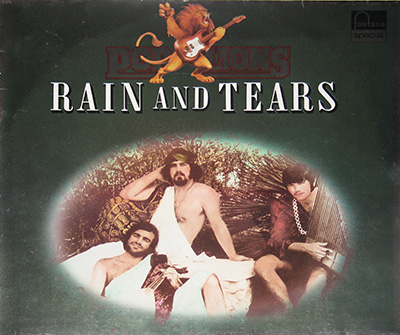Aphrodite's Child was a Greek progressive rock and psychedelic pop band formed in 1967. The band consisted of Demis Roussos (vocals), Vangelis Papathanassiou (keyboards), Lucas Sideras (drums), and Anargyros "Silver" Koulouris (guitar). The band was known for its unique blend of rock, pop, and classical music, as well as its incorporation of Greek traditional elements into its sound.
Aphrodite's Child was formed in Paris, France, and released its first album, "End of the World," in 1968. The band's most famous and critically acclaimed album, "666," was released in 1972. The album features the hit single "Rain and Tears," which was a top-ten hit in many countries.
Aphrodite's Child was one of the most popular and influential bands in Greece during the late 1960s and early 1970s. Its music was a major influence on the Greek rock scene and continues to be popular to this day. The band's music is often described as innovative, experimental, and ahead of its time.
After the release of "666," the band disbanded in 1972. Demis Roussos went on to have a successful solo career, while Vangelis became one of the most influential and successful film score composers of all time. Aphrodite's Child's music continues to be popular and has been reissued several times.
Demis Roussos, born 1946, in Alexandria, Egypt, was a renowned Greek vocalist and musician. His contribution to the music industry, particularly during his time with the progressive rock band Aphrodite's Child, marked a significant chapter in the cultural landscape of the late 1960s.
Aphrodite's Child, formed in 1967, consisted of Demis Roussos, Vangelis Papathanassiou, and Loukas Sideras. The band gained international recognition with their groundbreaking album "End of the World," released in 1968. This album showcased the group's experimental and avant-garde approach to music, blending various genres, including psychedelic rock, progressive rock, and electronic elements.
Roussos's distinctive voice and charismatic stage presence were crucial elements that added a unique dimension to Aphrodite's Child's sound. His powerful and emotive vocals were a perfect complement to the band's ambitious musical compositions.
One of the most notable achievements during this period was the release of "666," a double concept album that explored themes related to the Apocalypse. This ambitious project, produced in 1972, further solidified Aphrodite's Child as pioneers in the progressive rock genre. Demis Roussos played a pivotal role in shaping the album's atmosphere with his vocal versatility, ranging from haunting whispers to soaring crescendos.
However, despite the critical acclaim and artistic success of "666," internal conflicts within the band led to its eventual dissolution. Each member pursued individual musical paths, with Demis Roussos embarking on a solo career that would later become synonymous with his name.
In retrospect, Demis Roussos's contribution to Aphrodite's Child during this period laid the groundwork for his future success as a solo artist. The innovative and boundary-pushing nature of the music produced by the band reflected the zeitgeist of the late 1960s and early 1970s, a time marked by social and cultural upheavals.
Vangelis Papathanassiou, born 1943, in Volos, Greece, is a highly influential composer and musician, best known for his work in electronic and progressive rock music. During his time with the groundbreaking band Aphrodite's Child, Vangelis played a pivotal role in shaping the band's avant-garde sound and contributing to its creative brilliance.
Aphrodite's Child,comprised Vangelis on keyboards, Demis Roussos as the vocalist, and Loukas Sideras on drums. The band quickly gained attention for their innovative approach to music, fusing various genres such as psychedelic rock, progressive rock, and electronic elements. Vangelis's mastery of the keyboard, synthesizers, and other electronic instruments became a defining element of the band's sonic landscape.
One of the band's notable achievements during this period was the release of the album "End of the World" in 1968. Vangelis's synthesizer work on tracks like "Rain and Tears" showcased his ability to create atmospheric and otherworldly sounds, contributing to the band's unique identity.
However, it was with the ambitious double album "666," released in 1972, that Vangelis's musical genius truly shone. The album explored complex and avant-garde themes related to the Apocalypse, and Vangelis's synthesizer compositions played a central role in creating the album's atmospheric and experimental sound. Tracks like "The Four Horsemen" and "Break" showcased his ability to blend classical and electronic elements seamlessly.
Despite the critical acclaim and artistic success of Aphrodite's Child, internal conflicts led to the band's eventual dissolution. Each member pursued individual musical paths, with Vangelis embarking on a highly successful solo career that would solidify his reputation as a pioneering figure in electronic and cinematic music.
In retrospect, Vangelis's contributions to Aphrodite's Child during this period laid the foundation for his future achievements. The band's experimentation with electronic and progressive rock, coupled with Vangelis's innovative use of synthesizers, marked a crucial chapter in the evolution of music during the late 1960s and early 1970s.
